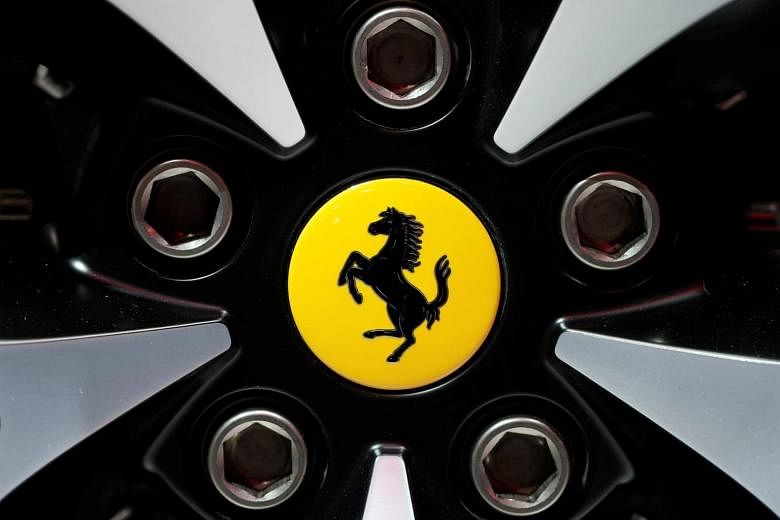TOKYO (THE YOMIURI SHIMBUN/ASIA NEWS NETWORK) - About 20 companies and individuals have been penalised by tax authorities in Japan for intentionally hiding profits, or failing to report profits, from the sale of expensive imported cars such as Ferraris, The Yomiuri Shimbun has learned.
A total of 800 million yen (S$9.8 million) in profit was concealed for several years through 2017. If cases in which profits were not reported at all are included, the total amount reaches 2.5 billion yen, according to sources.
One cause of the situation appears to be the low level of awareness among wealthy people of their tax obligations.
According to the sources, tax authorities including the Tokyo Regional Taxation Bureau and the Kantoshinetsu Regional Taxation Bureau penalised about 10 companies for intentionally hiding profits, or failing to report profits, from the sale of imported cars.
They included a cosmetics sales company based in Musashino, Tokyo, which resold a company-owned car, and auto sales companies in Nakano Ward, Tokyo, and Kawasaki.
The tax authorities also found that more than 10 individuals had concealed or failed to report profits. They include a former president of an automobile import and export company in Meguro Ward, Tokyo; a dentist in Minato Ward, Tokyo; and the president of a kimono shop in Ibaraki Prefecture.
These companies and individuals resold Ferrari, Porsche and other expensive imported cars to automobile import and export companies in Ota Ward, Tokyo, and Chiba Prefecture and others over several years through 2017.
Each gained profits ranging from several millions of yen to less than 200 million yen, but did not report it to tax authorities.
In cases that tax authorities deemed to involve misrepresenting or concealing profits, there was misconduct such as intentionally not reporting profits on sales when filing an income tax return despite being aware of the obligation to do so.
The total amount of back taxes owed, including a heavy additional tax and an additional tax for understatement, was about 700 million yen, the sources said.
For company-owned cars, the book value that is calculated based on a car's statutory useful life declines from the car's purchase price every year or every month. So, if a car's sales price exceeds its book value, the difference is subject to the corporate tax.
In the case of individuals, the profit on the sale of a car used for daily purposes such as commuting and shopping is not subject to tax.
However, if the profit from the sale of a car owned for recreational purposes exceeds a special deduction of 500,000 yen, the excess amount is subject to income tax. If the car was owned for over five years, the amount of taxable income will be reduced to half this amount.
According to a source close to the industry, rare Ferraris are given premium prices among expensive imported cars, with some sold for hundreds of millions of yen.
"Many wealthy people purchase such cars for resale purposes, and rarely drive them," the source said.
UNAWARE OF OBLIGATION
Multiple individuals whom tax authorities said had hidden profits or failed to report them told The Yomiuri Shimbun that they did not think they had to report the profit from the resale of a car to tax authorities.
"I had a car for recreational purposes, but sold it because its price rose," said a 53-year-old president of an interior carpentry company in Ibaraki Prefecture. "I never thought I had to report (the profit from the sale) to tax authorities."
He bought a Ferrari in the name of his company and used it privately for about nine years. He then resold it in 2015 at a profit of about 9 million yen, but did not report it as corporate income.
Another president of a construction material company in Hiratsuka, Kanagawa Prefecture, resold a Ferrari car he personally owned. He gained a profit of several tens of millions of yen, but did not report it as personal income.
"Expensive imported cars are the same as stocks," he said. "Their prices are affected by economic conditions, and if there are many people wanting to buy them, their prices surge."
"I didn't know whether I was obliged to declare (the income) because I sold it personally," he added.
However, tax authorities judged that these two presidents had intentionally not reported the income, and deemed them to have hidden it.
A 68-year-old male president of a car import and export company in Ota Ward, Tokyo, who has purchased cars from multiple individuals who were penalised by tax authorities for hiding income, said: "Some customers who hope to resell their cars asked me to do cash transactions. I thought they were trying to evade taxes by hiding the profit from the resale, but I had no choice but to accept their requests because they were my customers."
The company purchases about 10 Ferrari, Mercedes-Benz and other cars each year and exports them. The company also was inspected by tax authorities, which pointed out its failure to report an income of about 10 million yen by booking fictitious car maintenance expenses before exporting.
"After the tax inspection, I made it a rule to always keep transaction records, signing a contract with my customers when purchasing a car and receiving a receipt," the president said.
"I also recommend my customers to file a tax report."

